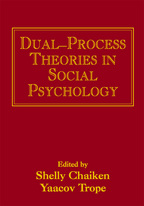Dual-Process Theories in Social Psychology
Edited by Shelly Chaiken and Yaacov Trope
1. What the Mind's Not, Gilbert
2. The History of Dual-Process Notions, and the Future of Preconscious Control, Moskowitz, Skurnik, and Galinsky
II. Dual-Process Theories in Attitudes and Social Cognition, and Single-Process Countermodels
A. Attitudes (and Beyond)
3. The Elaboration Likelihood Model: Current Status and Controversies, Petty and Wegener
4. The Heuristic-Systematic Model in Its Broader Context, Chen and Chaiken
5. The MODE Model of Attitude-Behavior Processes, Fazio and Towles-Schwen
6. Depth of Processing, Belief Congruence, and Attitude-Behavior Correspondence, Ajzen and Sexton
B. Person Perception
7. Spontaneous versus Intentional Inferences in Impression Formation, Uleman
8. A Dual-Process Model of Overconfident Attributional Inferences, Trope and Gaunt
9. Modes of Social Thought: Theories and Social Understanding, Levy, Plaks, and Dweck
10. Dual-Processing Accounts of Inconsistencies in Responses to General versus Specific Cases, Sherman, Beike, and Ryalls
C. Stereotyping in Particular
11. The Continuum Model: Ten Years Later, Fiske, Lin, and Neuberg
12. Dual Processes in the Cognitive Representation of Persons and Social Categories, Brewer and Harasty
13. On the Dialectics of Discrimination: Dual Processes in Social Stereotyping, Bodenhausen, Macrae, and Sherman
D. One or Two Processing Modes in Social Cognition?
14. Separate or Equal?: Bimodal Notions of Persuasion and a Single-Process "Unimodel," Kruglanski, Thompson, and Spiegel
15. Parallel Processing of Stereotypes and Behaviors, Kunda
16. Associative and Rule-Based Processing: A Connectionist Interpretation of Dual-Process Models, Smith and DeCoster
III. Issues of Cognition Control in Processing and Judgment
17. Automaticity and Control in Stereotyping, Devine and Monteith
18. The Cognitive Monster: The Case against the Controllability of Automatic Stereotype Effects, Bargh
19. The Role of Cognitive Control: Early Selection versus Late Correction, Jacoby, Kelley, and McElree
IV. Issues of Affect and Self-Regulation in Dual-Process Theories
20. Deliberative versus Implemental Mindsets in the Control of Action, Gollwitzer and Bayer
21. Sufficient and Necessary Conditions in Dual-Process Models: The Case of Mood and Information Processing, Bless and Schwarz
22. Affect in Attitude: Immediate and Deliberative Perspectives, Giner-Sorolla
23. Some Basic Issues Regarding Dual-Process Theories from the Perspective of Cognitive-Experiential Self-Theory, Epstein and Pacini
24. Processes Underlying Metacognitive Judgments: Information-Based and Experience-Based Monitoring of One's Own Knowledge, Koriat and Levy-Sadot
25. Promotion and Prevention as motivational Duality: Implications for Evaluative Processes, Higgins
V. Applications and Extensions of Dual-Process Theorizing
26. Exploring the Boundary between Fiction and Reality, Prentice and Gerrig
27. Motives and Modes of Processing in the Social Influence of Groups, Wood
28. The Social Contingency Model: Identifying Empirical and Normative Boundary Conditions on the Error-and-Bias Portrait of Human Nature, Tetlock and Lerner
29. On the Relationship between Social and Cognitive Modes of Organization, Baron and Misovich
30. Dualities and Continua: Implications for Understanding Perceptions of Persons and Groups, Hamilton, Sherman, and Maddox
31. When Do Decent People Blame Victims?: The Differing Effects of the Explicit/Rational and Implicit/Experiential Cognitive Systems, Lerner and Goldberg



